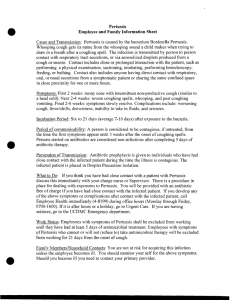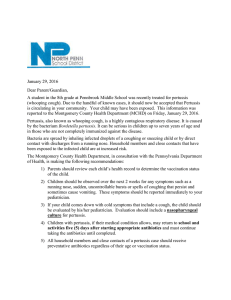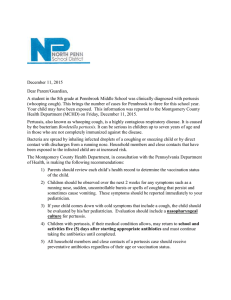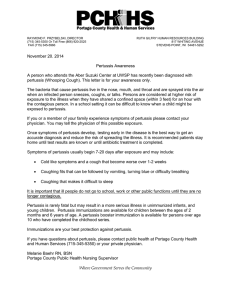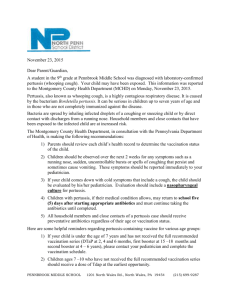New Jersey Department of Health and Senior Services Communicable Disease Service
advertisement
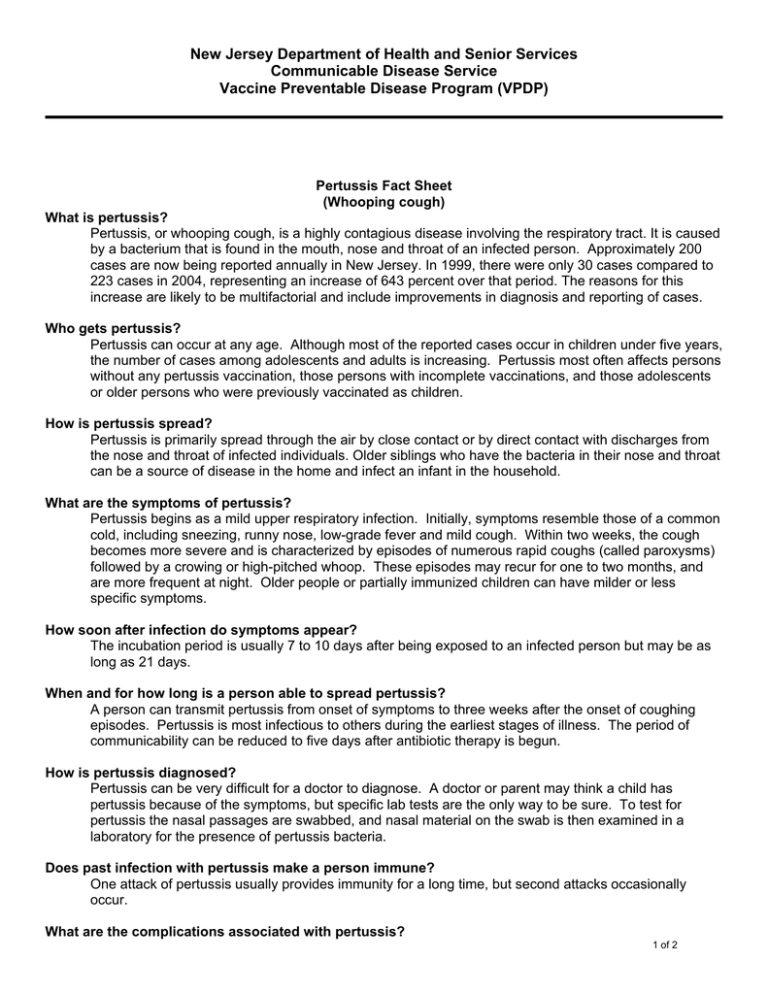
New Jersey Department of Health and Senior Services Communicable Disease Service Vaccine Preventable Disease Program (VPDP) Pertussis Fact Sheet (Whooping cough) What is pertussis? Pertussis, or whooping cough, is a highly contagious disease involving the respiratory tract. It is caused by a bacterium that is found in the mouth, nose and throat of an infected person. Approximately 200 cases are now being reported annually in New Jersey. In 1999, there were only 30 cases compared to 223 cases in 2004, representing an increase of 643 percent over that period. The reasons for this increase are likely to be multifactorial and include improvements in diagnosis and reporting of cases. Who gets pertussis? Pertussis can occur at any age. Although most of the reported cases occur in children under five years, the number of cases among adolescents and adults is increasing. Pertussis most often affects persons without any pertussis vaccination, those persons with incomplete vaccinations, and those adolescents or older persons who were previously vaccinated as children. How is pertussis spread? Pertussis is primarily spread through the air by close contact or by direct contact with discharges from the nose and throat of infected individuals. Older siblings who have the bacteria in their nose and throat can be a source of disease in the home and infect an infant in the household. What are the symptoms of pertussis? Pertussis begins as a mild upper respiratory infection. Initially, symptoms resemble those of a common cold, including sneezing, runny nose, low-grade fever and mild cough. Within two weeks, the cough becomes more severe and is characterized by episodes of numerous rapid coughs (called paroxysms) followed by a crowing or high-pitched whoop. These episodes may recur for one to two months, and are more frequent at night. Older people or partially immunized children can have milder or less specific symptoms. How soon after infection do symptoms appear? The incubation period is usually 7 to 10 days after being exposed to an infected person but may be as long as 21 days. When and for how long is a person able to spread pertussis? A person can transmit pertussis from onset of symptoms to three weeks after the onset of coughing episodes. Pertussis is most infectious to others during the earliest stages of illness. The period of communicability can be reduced to five days after antibiotic therapy is begun. How is pertussis diagnosed? Pertussis can be very difficult for a doctor to diagnose. A doctor or parent may think a child has pertussis because of the symptoms, but specific lab tests are the only way to be sure. To test for pertussis the nasal passages are swabbed, and nasal material on the swab is then examined in a laboratory for the presence of pertussis bacteria. Does past infection with pertussis make a person immune? One attack of pertussis usually provides immunity for a long time, but second attacks occasionally occur. What are the complications associated with pertussis? 1 of 2 New Jersey Department of Health and Senior Services Communicable Disease Service Vaccine Preventable Disease Program (VPDP) Complications of pertussis may include pneumonia, middle ear infection, loss of appetite, dehydration, seizures, brain damage, brief periods of absence of breathing and death. How and when is the vaccine for pertussis given? The vaccine for pertussis is usually given in combination with diphtheria and tetanus. Immunization authorities recommend that DTaP (diphtheria, tetanus, acellular pertussis) vaccine be given at two, four, six and 15-18 months of age and between four and six years of age. An adolescent/adult Tdap booster dose was licensed for individuals ages 10-64 in 2005 and may soon be recommended for certain persons in the future. What can be done to prevent the spread of pertussis? The single most effective control measure is immunizing as many individuals as possible against pertussis. Treatment of cases with certain antibiotics can shorten the contagious period. People who have or may have pertussis should stay away from children and infants until properly treated. Giving antibiotics to people who are close contacts of pertussis cases is also an important part of prevention. New Jersey Department of Health and Senior Services Send questions or comments to: njhealth@doh.state.nj.us Revised: April 2005- What’s This Month/Help 2 of 2
